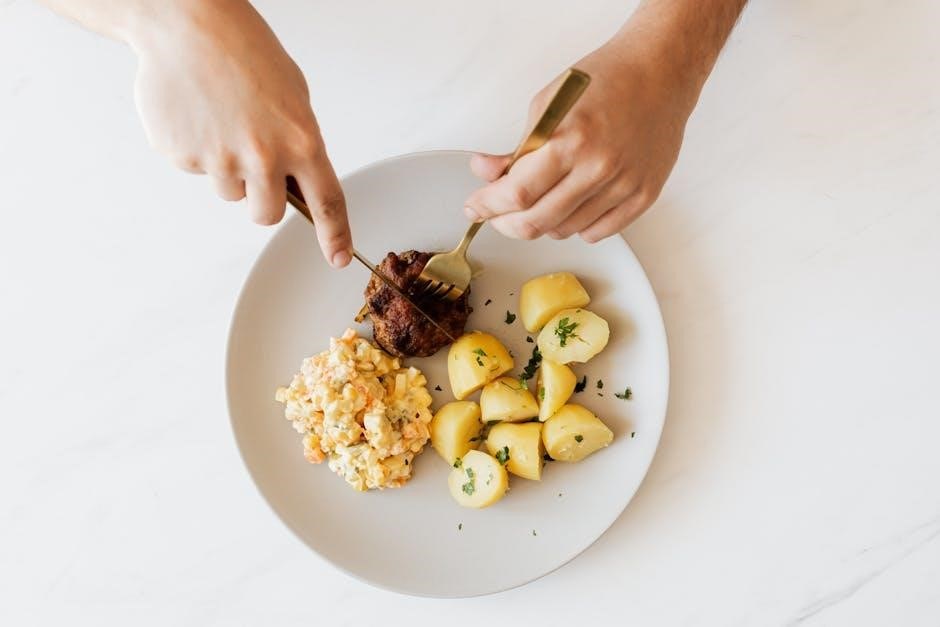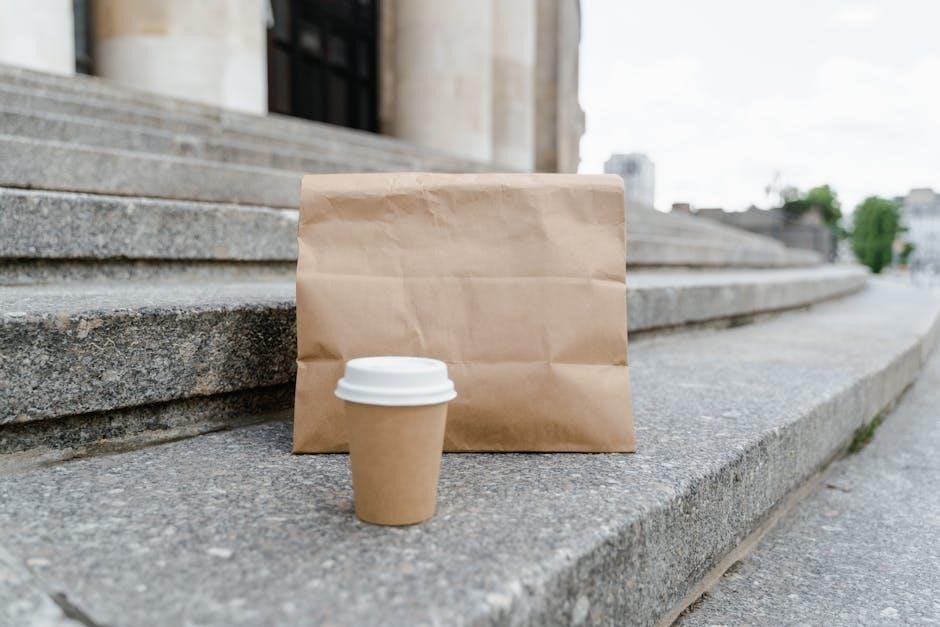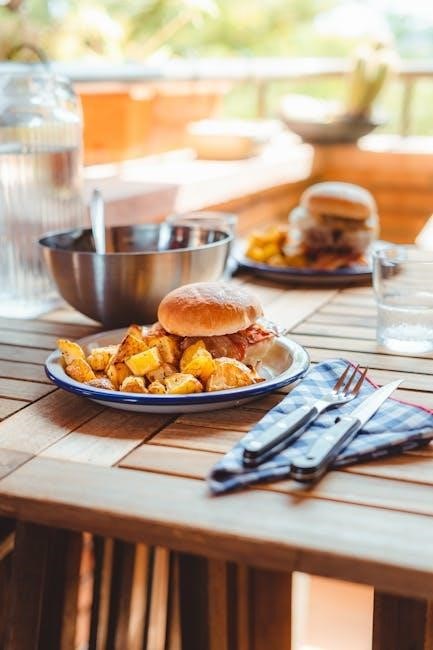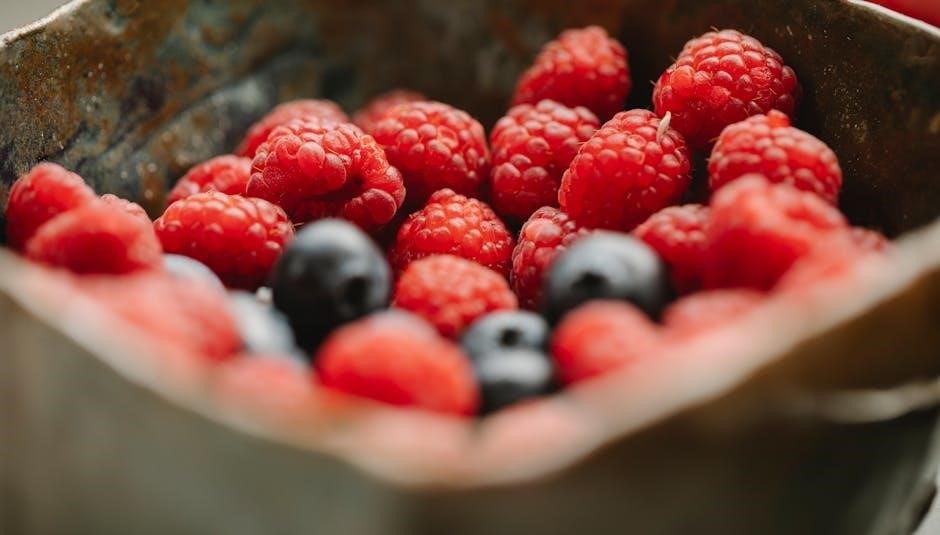A 5000-calorie meal plan is designed for individuals aiming to gain weight or muscle, focusing on balanced macronutrient intake and structured meals to meet high energy needs․

Why a 5000 Calorie Meal Plan?
A 5000-calorie meal plan is ideal for individuals seeking significant weight gain, particularly athletes or bodybuilders requiring high energy intake to build muscle․ This plan ensures a surplus of calories to support rapid muscle growth and recovery․ By focusing on nutrient-dense foods, it balances protein, carbohydrates, and fats to optimize performance and overall health, making it a structured approach to achieving weight gain goals effectively․
Importance of a High-Calorie Diet for Weight Gain

Importance of a High-Calorie Diet for Weight Gain
A high-calorie diet is essential for individuals aiming to gain weight, as it provides the necessary energy surplus to build muscle mass and support growth․ Consuming more calories than the body burns ensures weight gain, particularly when combined with strength training․ This approach helps in developing lean muscle tissue and improving overall body composition․ A structured high-calorie meal plan ensures that the additional calories come from nutrient-rich foods, promoting healthy weight gain and maintaining long-term health benefits․

Understanding Macronutrient Requirements
A 5000-calorie meal plan requires balancing macronutrients: 15-20% protein, 20-25% fats, and 60-65% carbohydrates, ensuring optimal energy and muscle growth while maintaining dietary balance․
Protein Requirements for Muscle Growth
Protein is crucial for muscle repair and growth, with recommendations suggesting 243 grams per day in a 5000-calorie plan․ High-quality sources like lean meats, eggs, and dairy provide essential amino acids․ Including protein-rich foods in every meal ensures muscle synthesis and recovery․ Proper intake supports muscle hypertrophy, vital for those aiming to gain weight or build muscle effectively․ Tracking protein consumption helps meet daily targets and maximizes muscle-building potential․
Carbohydrate Needs for Energy
Carbohydrates are the primary energy source, comprising 60-65% of a 5000-calorie diet․ With a recommended intake of 607 grams daily, they fuel workouts and recovery․ Focus on complex carbs like whole grains, fruits, and vegetables for sustained energy and nutrients․ Balancing carbs with protein and fats ensures optimal energy utilization and supports overall health and performance․ Proper carb intake is vital for maintaining stamina and meeting the high calorie demands of this meal plan․
Fat Intake for Caloric Density
Fat is crucial for achieving the caloric density required in a 5000-calorie meal plan, contributing 20-25% of total calories․ With approximately 145g of fat daily, it aids in absorbing essential nutrients․ Incorporate healthy fats like avocados, nuts, and olive oil to enhance meal calorie content without excessive volume․ Balancing fats with carbs and protein ensures a sustained energy supply and supports overall dietary goals, making high-calorie intake more manageable while maintaining nutritional balance․

Meal Plan Structure
A 5000-calorie meal plan is divided into five main meals: breakfast, mid-morning snack, lunch, afternoon snack, dinner, and optional nighttime snack․ Each meal is balanced with protein, carbs, and fats to ensure sustained energy and muscle growth; Portion sizes and calorie-dense foods are emphasized to meet daily goals․ Tracking tools help monitor intake and maintain consistency․
Breakfast Options
Breakfast should be calorie-dense and nutrient-rich to kickstart your day․ Options include oatmeal with whole milk, eggs, bacon, and toast․ Add calorie boosters like butter, peanut butter, or honey․ Protein shakes can supplement meals for extra calories․ Other ideas include pancakes or French toast with syrup, or Greek yogurt with granola and fruit․ These options provide a balanced mix of carbs, protein, and fats to support muscle growth and energy needs․ Portion sizes should be generous to contribute significantly to the 5000-calorie goal․
Mid-Morning Snacks
Mid-morning snacks are essential for maintaining energy levels and progressing toward the 5000-calorie goal․ Opt for calorie-dense options like nuts (almonds, walnuts), dried fruits (dates, raisins), or high-protein bars․ A combination of fresh fruit with peanut butter or a protein shake can also be effective․ Portion sizes should be generous, aiming for 300-400 calories per snack․ These snacks provide a balanced mix of carbs, protein, and fats, keeping you fueled until lunch․ Incorporate variety to ensure a broad nutrient intake and prevent monotony․
Lunch Ideas
Lunch should be a substantial meal, contributing significantly to the 5000-calorie target․ Prioritize protein-rich foods like grilled chicken, turkey, or fish, paired with complex carbs such as brown rice, quinoa, or whole-grain bread․ Incorporate healthy fats like avocado, olive oil, or nuts to boost caloric density․ Aim for a balanced plate with steamed vegetables to ensure fiber intake․ Portion sizes should be large, with meals often exceeding 700-800 calories․ Adding a side of fruit or a milkshake can further enhance caloric content, supporting weight gain and muscle growth․ Variety is key to maintaining interest and meeting nutritional needs․
Afternoon Snacks
Afternoon snacks are crucial for maintaining momentum toward the 5000-calorie goal․ Opt for high-calorie, nutrient-dense options like trail mix with nuts, dried fruits, and chocolate chips․ Protein-rich snacks such as Greek yogurt with honey or a protein shake can also be beneficial․ Pair whole-grain crackers with peanut butter or avocado for a calorie and fiber boost․ Smoothies made with whole milk, fruit, and protein powder are another excellent choice․ Generous portion sizes and calorie-dense foods are key to meeting daily requirements and supporting weight gain effectively․
Dinner Suggestions
Dinner should be rich in calories and nutrients to support weight gain․ Grilled chicken or salmon with roasted potatoes, sweet potatoes, or rice are excellent choices․ Include calorie-dense sides like avocado, quinoa, or corn․ Lean beef or pork with steamed vegetables provides essential protein and fats․ Add healthy fats like olive oil or butter to increase calorie content․ Consider hearty stews or casseroles with ground meats and root vegetables․ Portion sizes should be generous, and include extras like cheese, sauces, or whole milk to boost calories․ Pair with a protein shake if needed to meet daily goals․
Nighttime Snacks
Nighttime snacks are crucial for meeting high calorie needs, especially before bed․ Opt for calorie-dense options like whole milk, peanut butter with whole-grain toast, or a protein shake with added oats․ Greek yogurt with honey and nuts, or a handful of mixed nuts and dried fruit, are also excellent choices․ These snacks provide sustained energy and support muscle recovery while sleeping․ Aim for snacks rich in healthy fats and protein to maximize calorie intake without excessive volume․ Pairing carbs with fats can enhance calorie density and satisfaction․

Sample Daily Menu
A sample daily menu outlines meal structures to reach 5000 calories, ensuring balanced macronutrients and nutrient-dense foods, tailored for weight gain and muscle growth effectively․
Breakfast Nutrition Facts
A typical breakfast in a 5000-calorie meal plan includes oatmeal, protein shakes, and whole-grain toast․ For example, 2 cups of oatmeal provide 224 calories, 43g of carbs, and 5g of protein․ Adding a scoop of whey protein and nuts boosts calories and macronutrients further․ This meal balances carbs, protein, and fats to kickstart metabolism and energy levels, ensuring a strong foundation for the day’s caloric intake while maintaining nutritional balance․
Lunch Nutrition Facts
A high-calorie lunch might include grilled chicken, brown rice, and steamed vegetables․ For instance, 6 ounces of chicken provide 360 calories, 30g of protein, and 6g of fat․ Paired with 2 cups of rice and a side salad, this meal offers approximately 800 calories, 100g of carbs, and 40g of protein․ This balance supports muscle growth and energy replenishment while maintaining dietary diversity and flavor, ensuring midday fuel for active individuals aiming to meet their daily caloric goals;
Dinner Nutrition Facts
A typical dinner in a 5000-calorie meal plan might include grilled salmon, roasted sweet potatoes, and steamed broccoli․ For example, 8 ounces of salmon provides 560 calories, 50g of protein, and 30g of fat․ Paired with 2 large sweet potatoes (300 calories, 60g carbs) and a cup of broccoli (55 calories, 10g carbs), this meal totals approximately 915 calories, with 130g of carbs, 50g of protein, and 30g of fat․ This balanced dinner supports muscle recovery and energy replenishment while contributing to the overall caloric intake․
Snack Nutrition Facts
Snacks play a crucial role in a 5000-calorie meal plan, contributing significantly to daily caloric intake․ For example, a snack like a mix of nuts and dried fruits (e․g․, almonds, cashews, and raisins) provides approximately 400 calories, 40g of carbs, 15g of protein, and 25g of fat․ Another option, such as whole grain crackers with peanut butter, offers 350 calories, 30g of carbs, 10g of protein, and 20g of fat․ These snacks are calorie-dense, helping to meet the high energy demands of the plan while supporting muscle growth and energy levels․

Additional Tips
Consistency is key to achieving weight gain goals with a 5000-calorie meal plan․ Use calorie-counting apps to track intake, stay hydrated, and maintain proper meal timing for optimal results․
Calorie Counting and Tracking Tools
Accurate calorie tracking is essential for a 5000-calorie meal plan․ Use mobile apps like MyFitnessPal or Lose It! to log meals and ensure daily goals are met․ These tools provide detailed nutrition information, helping maintain macronutrient balance․ For manual tracking, spreadsheets or food diaries can be effective․ Regularly monitoring intake ensures consistency and progress toward weight gain objectives․ Additionally, barcode scanners and food databases simplify tracking, making it easier to manage high-calorie diets efficiently․ Consistent tracking helps identify areas for adjustment and supports long-term success․

Hydration and Meal Timing
Staying hydrated is crucial while following a 5000-calorie meal plan, as high-calorie diets can be dense and taxing on the body․ Aim to drink at least 8-10 glasses of water daily, spaced evenly between meals․ Proper meal timing is also key; spreading meals throughout the day ensures consistent energy intake․ Avoid overhydration during meals to prevent digestive discomfort․ Additionally, consider timing nutrient-dense meals around workouts to optimize performance and recovery․ Balancing hydration and meal frequency supports overall health and helps maintain the body’s ability to process a high-calorie intake effectively․ Consulting a nutritionist can provide personalized timing strategies․
Meal Prepping for Consistency
Meal prepping is essential for maintaining consistency in a 5000-calorie diet, ensuring steady nutrient intake and reducing the risk of missed meals․ By planning and preparing meals in advance, individuals can save time, avoid food waste, and stay committed to their dietary goals․ Portioning meals and snacks in advance helps manage calorie intake effectively․ Additionally, meal prepping allows for better organization, reducing stress and ensuring that high-calorie requirements are met consistently․ This approach is particularly beneficial for those with busy schedules, as it promotes adherence to the meal plan and supports overall weight gain objectives․

Supplements for Weight Gain
Supplements can play a crucial role in supporting a 5000-calorie meal plan by filling nutritional gaps and boosting calorie intake․ High-protein shakes and mass gainers are popular options, providing concentrated calories and nutrients․ Creatine supplements can enhance muscle growth and strength, while omega-3 fatty acids support overall health․ Additionally, multivitamins ensure adequate micronutrient intake, which is essential for optimal metabolism and energy production․ When combined with a structured meal plan, these supplements can accelerate weight gain and muscle development, helping individuals achieve their goals more efficiently․ Always consult a healthcare professional before starting any supplementation regimen․
Consistency is key to achieving weight gain with a 5000-calorie meal plan․ Regularly monitor progress, adjust portions, and consult a professional for personalized advice to ensure success․
Importance of Consistency
Consistency is vital for achieving weight gain with a 5000-calorie meal plan․ Skipping meals or inconsistent eating can hinder progress, as the body requires a steady supply of calories and nutrients to build muscle and support metabolic needs․ Sticking to the structured meal plan ensures that energy levels remain stable and that nutritional goals are met daily․ Over time, consistency helps develop healthy eating habits and supports long-term success․ Tracking progress and adjusting portions as needed ensures the plan remains effective and tailored to individual needs․
Monitoring Progress
Monitoring progress is essential to ensure the 5000-calorie meal plan is effective․ Regular weigh-ins and body measurements help track weight gain and muscle growth․ Using a calorie counting app to log meals ensures daily goals are met․ Additionally, assessing energy levels and physical performance can indicate if the plan is working․ Adjustments may be needed if progress stalls, such as increasing protein intake or balancing macronutrients․ Consistent tracking helps identify patterns and maintains motivation, ensuring the plan aligns with long-term goals for healthy weight gain and muscle development․



